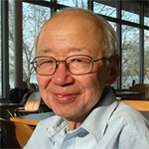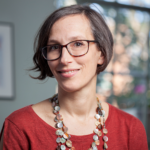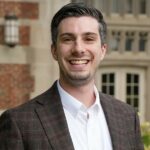
All lectures are presented fully online via Zoom every Friday at 3:30 PM. The link to join the meeting is https://go.wisc.edu/l880yf except when otherwise indicated. Alumni, friends and the public are always invited to attend.
 October 3rd– Engineers of the microclimate: Adaptive landforms and surplus populations in nature-based solutions
October 3rd– Engineers of the microclimate: Adaptive landforms and surplus populations in nature-based solutions
Associate Professor Leigh Johnson, University of Oregon
In recent years, an unassuming landform has multiplied over tens of thousands of hectares across East African drylands. Known as “semi-circular bunds” or “half-moons”, these small earthen semi-circular catchments are dug in hopes of capturing water runoff, regenerating rangeland grasses, and improving local microclimates. NGOs and humanitarian agencies champion them as ideal nature-based solutions: low-tech, low-cost, and scalable – a “third way” of combatting climate change at the local level given the systemic failures of mitigation and adaptation. Yet so far there is little systematic evidence of bunds’ effectiveness at the scales on which they are now being built. They are extraordinarily expensive and labor intensive to create, and easy to destroy. They hold no explicit carbon value, nor are they indigenous to East Africa. Why, then, did these landforms proliferate so widely across Kenya during the devastating drought in the Horn of Africa from 2020-2023, without any government directives for their construction? In this talk, I follow these landforms and the labor necessary to replicate them at scale. I argue that conservation actors increasingly rely on bunds to sediment social-material license to operate in pastoral rangelands. The surprisingly high pay bund diggers earn is best understood as a form of private indirect welfare provision for rural populations rendered surplus by conservation and carbon projects. Yet pastoralists themselves imbue bunds with diverse forms of value and promise, forcing us to grapple with both the limitations and affordances of action at the microclimate scale.
 October 17th– The Paradox of Intimate Care: Volunteers, Boundaries, and Self-Sufficiency in Refugee Resettlement
October 17th– The Paradox of Intimate Care: Volunteers, Boundaries, and Self-Sufficiency in Refugee Resettlement
Professor Banu Gökarıksel, University of North Carolina – Chapel Hill
Through a feminist geographies of care perspective, this talk locates a key paradox in the U.S. refugee resettlement system that places volunteers and refugees in intimate relationships of care but also promotes contradictory neoliberal notions of self-sufficiency and individual boundaries. Based on interviews with volunteers and refugee resettlement agencies in North Carolina, I trace how research participants identify the boundaries they build, maintain, or muddle as they perform their caring work. I analyze volunteers’ responses to boundaries and the strategies they develop, such as “going rogue” to establish caring relationships outside of the temporal, spatial, and interrelational boundaries imposed by the U.S. refugee resettlement system.
 November 14th– Race, Risk, and Redlining: Insurance Maps and the Racial Capitalism of Risk Management in Urban America
November 14th– Race, Risk, and Redlining: Insurance Maps and the Racial Capitalism of Risk Management in Urban America
Assistant Professor Jack Swab, University of Tennessee-Knoxville
For over a century, Sanborn fire insurance maps underwrote racial capitalism and insurance redlining in more than 12,000 U.S. cities. Far more widespread than the Home Owners’ Loan Corporation (HOLC) maps of the Great Depression most associated with redlining, fire insurance maps embedded racialized logics of risk that shaped underwriting across residential, commercial, and industrial properties. In this talk, I explore the role of race in the creation and use of fire insurance maps, articulating how conceptions of racial “risk” played out spatially to create forms of insurance redlining. With examples from across the nation, I show how Sanborn maps were essential in the underwriting process to sustain racial capitalism from the late nineteenth to the mid-twentieth century.